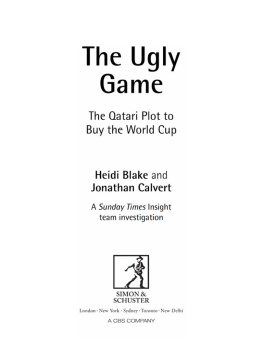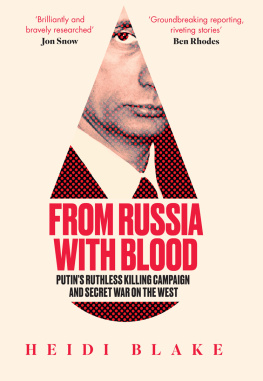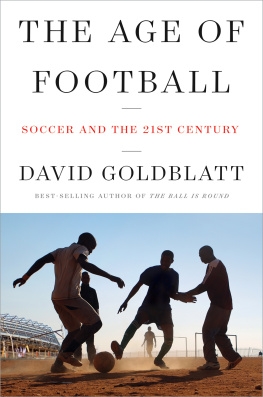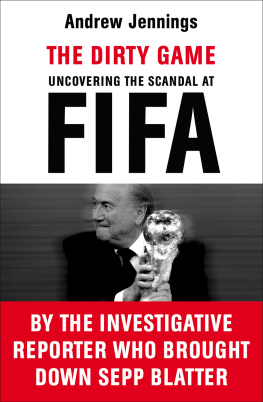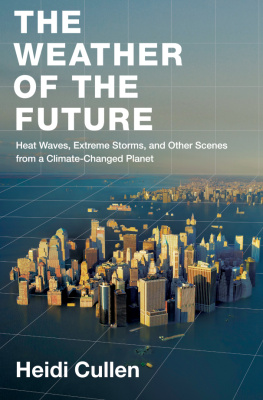The Ugly Game
First published in Great Britain by Simon & Schuster UK Ltd, 2015
A CBS COMPANY
Copyright 2015 by Times Newspapers Limited
This book is copyright under the Berne Convention.
No reproduction without permission.
All rights reserved.
The right of Heidi Blake and Jonathan Calvert to be identified as the authors of this work has been asserted by them in accordance with sections 77 and 78 of the Copyright, Designs and Patents Act, 1988.
Simon & Schuster UK Ltd
1st Floor
222 Grays Inn Road
London WC1X 8HB
www.simonandschuster.co.uk
Simon & Schuster Australia, Sydney
Simon & Schuster India, New Delhi
Every reasonable effort has been made to contact copyright holders of material reproduced in this book. If any have inadvertently been overlooked, the publishers would be glad to hear from them and make good in future editions any errors or omissions brought to their attention.
A CIP catalogue record for this book is available from the British Library
ISBN: 978-1-47114-934-4
Trade paperback ISBN: 978-1-47114-935-1
Ebook ISBN: 978-1-47114-936-8
Typeset by M Rules
Printed and bound by CPI Group (UK) Ltd, Croydon, CR0 4YY
This book is dedicated to the casualties of corrupt decisions everywhere and the whistleblowers who risk so much to expose the rot in the hope of a better world.
Prologue
The announcement that the tiny desert state of Qatar had been chosen to host the football World Cup in 2022 was greeted with shock and disbelief in the packed auditorium in Zurich and around the world. The great and the good of international football exchanged incredulous glances in stunned silence as the Qatari royal family erupted into jubilant cheers, clenching their fists in the air.
It was a snowy afternoon on 2 December 2010 in the Swiss city where FIFA, world footballs governing body, has its headquarters. This was the climax of years of frenzied campaigning by the nine countries competing to host the worlds biggest sporting tournament worth billions of dollars and priceless prestige to the victor.
How had a minuscule Gulf state, with virtually no football tradition or infrastructure and searing summer temperatures of up to 50C, beaten established footballing countries with much stronger bids? One man, more than any other in that room, knew the answer. Mohamed bin Hammam, the billionaire Qatari FIFA official, waited modestly for the royal celebrations to subside before stepping forward to embrace the Emir and kiss the young sheikh at the head of his countrys bid on the cheek. No casual observer would have guessed that this dapper man, with his mild manner and his neat silver beard, was the true architect of Qatars astonishing and improbable victory. Even the men who ran the official bid committee would tell you he had nothing to do with their campaign.
Since that day in Zurich, allegations of corruption have swirled around Qatars World Cup bid. Journalists, private investigators and powerful figures in football have tried to unravel the mystery of how the royals commanding the countrys campaign from their desert palaces could have pulled off such an audacious feat. But the hidden hand of Bin Hammam remained a closely guarded secret until a massive leak of confidential data changed everything.
In the early months of 2014, more than three years after Qatars triumph, journalists working at The Sunday Times Insight team in London received a phone call. The familiar voice of a well-connected source at the top of world football told them a whistleblower from inside FIFA had come forward with what appeared to be a large and explosive cache of documents. The source arranged an introduction and then took a step back. Coming face to face with the Insight team, Jonathan Calvert and Heidi Blake, for the first time in a London hotel, the whistleblower explained nervously how he had developed grave concerns about the way Qatar had won the World Cup and had decided its secrets needed to be spilled.
He led the journalists to a discreet location far away from London where they were shown a treasure-trove of hundreds of millions of documents stored on a network of supercomputers. Many of the files related to the activities of Bin Hammam working secretly to bring the World Cup to Qatar against the odds. The whistleblower himself had barely scraped the surface of the vast mass of information, but he wanted the journalists to dive in. Over the course of the next three months, the reporters worked day and night in a secret data centre with the blinds drawn, surrounded by the whirring of overheating servers and the blinking lights of powerful machinery, all hidden behind the bland faade of a high-street shop front.
The scale of the leak was unprecedented. The whistleblower had given the reporters the key to emails, faxes, telephone logs, electronic messages, letters, bank slips, accounts, cash chits, handwritten notes, flight records, secret reports, diaries, minutes of confidential meetings, computer hard drives and more. The documents were a portal into the secret command centre from which Bin Hammam waged his campaign to buy World Cup support and later the dare-devil attempt to topple the FIFA president Sepp Blatter which led to his own spectacular downfall. The reporters used forensic search technology to unravel the network of slush funds from which he paid millions of dollars in bribes to scores of FIFA officials and to piece together the backroom deals and vote-rigging ploys which brought him first victory and then disgrace. The man who overcame the odds to bring glory to his country now lives anonymously in his mansion in Doha, the capital of Qatar, estranged from the royal family he once served and sworn to silence as preparations for the World Cup he brought home to his city gather pace around him.
The Ugly Game comes in the wake of The FIFA Files expos in The Sunday Times a world exclusive that made headlines around the planet when it broke on the eve of the Brazil World Cup in June 2014. It tells the extraordinary story of the most corrupt World Cup bidding contest in history, shining a light into the darkest recesses of FIFA through the portal of Bin Hammams secret campaign. It is a human drama of personal triumph and disaster, of one man who realised an impossible dream but was brought low by overreaching ambition. It is a tale awash with dirty money but glittering with mystery and intrigue its characters swept up in the treacherous currents of sports power politics. Above all it is an invitation to join Bin Hammam as he moves through the corridors of world football greasing palms and striking deals; revealing the ugly venality of the men who control the beautiful game.
One
A Surprising Proposal
The air was thick with tobacco smoke and tension. A small clutch of men in long white dishdashas were craning around their host Mohamed bin Hammam in the dimly lit room. Cardamom-scented steam rose from cups of Arabic coffee freshly poured from a fine golden dallah by robed servants who melted in and out of the shadows. No one was watching the football match flickering on the wall. The Qatari billionaire had a lot to get off his chest, and his guests were listening intently. Tonight, like every other night, Bin Hammam was holding court in his majlis, the male-only sitting room of his Doha mansion where local men came to lounge in exquisite comfort as they smoked and drank coffee or mint tea.
These evenings had once been relaxed and jovial affairs, alive with the hubbub of many voices and shouts of celebration or dismay as goals were scored or saved on the giant television screens. Bin Hammam was known by his friends around the world for being generous to a fault, and he was never without company. At the peak of his success, he had opened his home every night to dozens of men who piled into the sitting room at sunset to talk and watch football before moving through to the dining room to feast on Qatari specialities at his banqueting table. His guests gorged themselves on flatbreads stuffed with marinated shawarma meat, vine leaves, spicy kabsa, zatar pie, tabbouleh salads, baba ghanoush and ghuzi lamb, all washed down with ice-cold mineral water.

